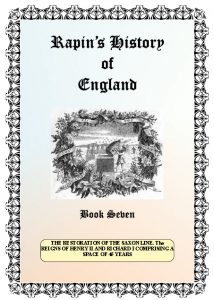Chapter I
HENRY II Sirnamed Plantagenet
A. D. 1154
THE English were too weary of the civil wars, which had so long afflicted the kingdom, willingly to run the hazard of seeing them renewed. Though the death of Stephen might have easily furnished an occasion for fresh commotion, they peaceably waited for the duke of Normandy, who could not come into England, till six weeks after he had received the news[1]. During this interval, not a man offered to dispute his title. Besides that prince William, son of the deceased king, was a prince of little merit, the late proceedings of most of the barons against the king his father kept them from adhering to the fortune of the young prince, for fear of putting it in his power to be revenged. Moreover, Henry was not only powerful beyond sea, but had also a great party in the kingdom, and the strongest places were in the hands of his creatures. And, therefore, supposing William had been willing to try to place himself on the throne, he would have wanted the necessary assistance to accomplish his design.
A. D. 1155] Henry was crowned[2] the next day after his arrival, pursuant to the agreement made with Stephen, of which all the barons of the realm were guarantees. It was with extreme satisfaction, that the English beheld on the throne a prince descended by his mother from their ancient kings, and who gave the crown a brighter lustre than ever. He added to it, as so many new gems, Poictou, Guienne, Saintonge, Maine, Anjou, Touraine, and Normandy, of which he was in actual possession. Meantime, England, the most considerable part of his dominions, had endured such violent shocks in the late reign, that in order to recover its ancient splendour, some rest was necessary.
The most proper means to that end, was the putting it out of the power of the factious to excite new troubles. Accordingly Henry made that his chief business from the first hour of his reign. He began with demolishing the great number of castle’s that had been fortified in Stephen’s reign, and served only for sanctuaries to robbers, and disturbers of the public[3]. The bishop of Winchester alone had six of the most considerable, which he forfeited for going out of the kingdom without leave.
